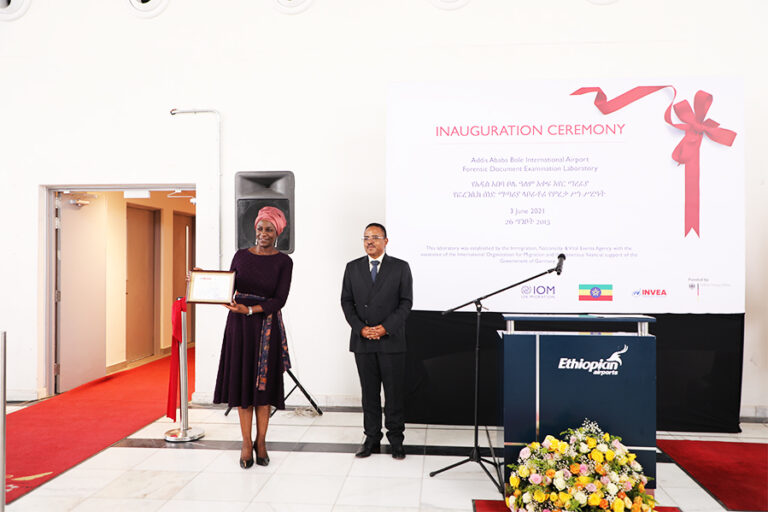Djibouti Port and Free Zone Authority (DPFZA), Paris Airport and Egis have signed a deal to come up with the realization of the highly anticipated Al Haj Hassan Gouled Aptidon International Airport that target to boost the logistics sector with full aspect.
On the ceremony held on Thursday June 3, a memorandum of understanding (MoU) of studies, blueprint, financing and construction of the new Al Haj Hassan Gouled Aptidon International Airport have been signed in the Djibouti Free Zone at PK 23, amongst the trio.
According to the announcement of DPFZA, the protocol follows the visit of Ismael Omar Guelleh, President of Djibouti; in Paris where both leaders including President Emmanuel macron have agreed that France will support the project of a new airport.
The studies and the elaboration of the airport master plan are financed by the Fund of Studies and Support to the Private Sector (FASEP) of the French Treasury Department.
Aboubakar Omar Hadi, President of DPFZA, said that the new facility is crucial for the expansion of the of the logistics sector on the new sphere, “the importance of this new airport in strengthening the multimodal chain in our country.”
The construction of this new International Airport is an important step in the strategy of creating transport synergy and will complement the missing link in the supply chain in Djibouti.
The airport will have a cargo terminal to serve as a basis for air-sea logistics and thus transform Djibouti into a strategic airport hub in the region.
On the signing ceremony, Hassan Houmed Ibrahim, Minister of Infrastructure and Equipment, and Arnaud Guillois, the French ambassador to Djibouti, accompanied by the Director of the French Development Agency Philippe Collignon as well as the representatives of French companies Paris Airport and EGIS were the attendees of the ceremony.
Hassan Gouled Aptidon International Airport is a planned new airport construction project that is located around Ali-Sabieh, which is the town on the corridor to Dire Dawa.
IOM, INVEA inaugurate first forensic document examination laboratory at Ethiopia’s largest airport
The International Organization for Migration (IOM), in collaboration with Ethiopia’s Immigration, Nationality and Vital Events Agency (INVEA), inaugurated Ethiopia’s first forensic document examination laboratory at Addis Ababa Bole International Airport on 3 June 2021.
An estimated 9,300 passengers pass through Bole Airport -the country’s largest port of entry-daily.
Equipped with state-of-the-art technology such as video spectral comparators, luminescent microscopes and light tables, the laboratory will help INVEA verify the authenticity of travel documents and improve fraud detection, thereby enhancing Ethiopia’s capacity to ensure the safe and orderly movement of people into its territory.
“As a signatory to the African Union free movement of persons protocol, the Continental Free Trade Area Agreement and of the free movement agenda of the Intergovernmental Authority on Development (IGAD), the Government of Ethiopia is committed to strengthening its border governance. The newly established forensic lab will go a long way in assuring physical border security and human security for the country’s citizens and other populations crossing its borders,” Mujib Jemal, Director General of INVEA, said.
The laboratory was set up with the financial support of the Government of Germany.
The Government of Germany is supporting IOM to strengthen Ethiopia’s immigration and border management capacity, including through the provision of infrastructure and equipment, specialized trainings for government officials, as well as improving Ethiopia’s immigration and border management governance framework.
Ambassador Auer said, “The detection of counterfeit or improperly used identity documents is essential in the fight against crime and to enable effective border management. These in turn are crucial parts in strengthening the rule of law. Therefore, Germany is glad that through our support to IOM, INVEA at Bole International Airport is now equipped with modern technology for forensic investigations of documents in order to detect counterfeits, improve border control, and ultimately help to foster the rule of law.”
Prior to the inauguration, ten INVEA officers were trained on how to operate the newly installed equipment at Bole Airport. They will become INVEA’s fraud detection and document verification specialists and train their own workforce, supported by IOM’s Document Examination Laboratory Manual for the Immigration Environment and IOM’s Passport Examination Manual.
IOM’s Achieng underlined “that the need for the Government of Ethiopia to enhance its domestic capacities in border management by addressing migration governance gaps, developing material and human resource capacities, and fostering cross-border cooperation. The establishment of this forensic laboratory is a step in the direction of realizing these goals and of ensuring that all movement across Ethiopia’s borders takes on a safe, legal and humane form.”
The inauguration ceremony was attended by among others, Mujib Jemal, Director General of INVEA, Stephen Auer, German Ambassador to Ethiopia, Maureen Achieng, IOM Chief of Mission to Ethiopia and Representative to the African Union and United Nations Economic Commission for Africa, and Tewolde Gebremariam, Ethiopian Airlines Chief Executive Officer.
Somaliland casts ballot
Somalilanders, who have a universal suffrage of 15 years as per the sharia practice, have recently been engaged in a combined parliamentary and local government election on May 31.
Such kind of combined election has been held for the first time on a democratic process in the country. The government said that despite this being a first in terms organizing such type of huge democratic event, the lessons drawn from it will play an integral role in future elections for years to come.
On the very hot weathered Election Day of Monday May 31, polling stations saw long queues as residents from different age group cast their votes, while the occasion was very peaceful on the Election Day, as well as post and pre-election days as per the observation of Capital.
The national event which was highly anticipated by the political parties and the community alike was concluded peacefully. Moreover, Capital observed the situation in different places such as the capital in Hargeisa, a settlement with over a million inhabitants and some suburbs, which overall was noted to be peaceful.
The Somaliland National Electoral commission that is led by seven board members had facilitated 2,709 polling stations all over the country to manage the crowd which was up from 1,642 polling stations in 2017 that was for presidential election which involved over 700,000 voters.
From the total of about four million people of Somaliland that share wide borders with eastern Ethiopia, over one million registered to vote.
Most of residents of Hargeisa that Capital spoke to regarding the elections confidently gave their testimony affirming that the process has been democratic, fair and peaceful and are hopeful that the results will lead to the betterment of the country and the community.
Political elites of the country said that the process reaffirms the effort to build confidence on the international community and that Somaliland should be viewed as a modern, qualified and a state that deserves to be recognized as a nation.
Experts in the region and international commentators amplified that the country which proclaimed its independence three decades ago from Somalia has continued on its democratic political culture which should be a lesson for other countries in the continent.
Two days before the election day Khalid Abdirahman, Director of Somaliland Local Governments Association, said in a tweet that other parts of Africa, election campaigns mean insecurity, bloodshed and conflict whereas in Somaliland the election campaign is another celebration in which people come out to sing, dance, jump, walk the city on foot or in a car or in general what youth call “fun times”.
On the election that include three political parties; the ruling Peace, Unity and Development Party (Kulmiye), Justice and Welfare Party (UCID) and Waddani National Party held their first competitive race for parliament since 2005.
Experts estimated that the major seat of the parliament will be taken by the ruling Kulmiye party.
Mohammed Kahin Ahmad, Interior Minister, after his cast told journalists that as a Minister of Interior all regions have started the election smoothly.
He said the event was the seventh election in the history of the country with three presidential election and peaceful transfer of power.
“Two combined election to transpire together is a first for the country. We hope that every citizen would have a chance to choose its representatives,” Abdurahman Mohammed Abdullahi, Chairperson of Waddani Party said after he casted his vote on Monday morning.
“The nation and people of Somaliland is every well experienced with the elections. I do believe and it is obvious that the international observers have seen firsthand how the Somaliland election is much better in security, performance as opposed to major parts of elections in the continent of Africa and some parts of the third world,” Kahin Ahmad praised.
“This time it is the first for our country to manage the two elections at a time,” he echoed, expressing that meanwhile it is very heavy for Somaliland to manage two at a time but he believes it will help with the growth of the country as a whole.
He and other political leader consider such kind of credible democratic events to lead to the country to obtaining international recognition. “The election is very important for having recognition from the international community for strengthening our democratic process for our constitution,” he said.
About the day, Mohammed Abdullahi said that it is extremely important since the people have been waiting for the parliament to change 15 years and 8 years for local government.
“The international community has to pay much attention for Somaliland which has a process of democracy unlike many other African countries. This is an example for democracy working in African, so I would suggest the international community to give their attention for Somaliland,” the leader of one of the three competing parties commented.
The Somaliland elites argued that their country has fulfilled all international requirements to be recognized as an independent state.
The information that was obtained from Ministry of Information, Culture and National Guidance, expressed that unlike the previous experience the government has almost covered the cost of the election.
In the past international partners had contributed for the election expense but this time the government covered at least 95 percent of the total budget. Since it does not get political recognition, the country mostly covers its cost and budget by itself, except very small humanitarian aids.
The electoral commission has implemented a modern system to conduct well accepted election this time around. To mitigate the election related fraud, the election process has been supported by biometric technology.
For the local and parliamentary election totally 993 candidates have been registered, while 28 candidates from the stated number is female including 13 who run for parliamentary seats.
246 Candidates under the three registered political parties were eying for 82 parliament seats.
One of the extraordinary incidents on the current parliamentary election that everybody in the town was talking about is a candidate from the minority clan. Barkhad Jama Hersi Batun, a member of the Waddani party, was the only parliamentary candidate from a minority clan, which is a first for the country.
The current members of parliament that are expected to be fully replaced by fresh members were elected in 2005; however the current election is for the second time in the history of the country.
International observers include 103 individuals from different countries had attended the event as external witness.
A preliminary election result is scheduled to come out in ten days after the Election Day.
Ethiopian distance star Yalemzaf takes on Antrim Coast event
The Ethiopian distance running sensation and second fastest women of all time (64min 46seconds), Yalemzaf Yehuwalaw has confirmed that the Antrim Coast HalfMarathon will be one of only four events she will race in 2021, and the first after the Tokyo Olympics.
The athlete’s agent confirmed Yalemzaf will be making a serious attempt at the current Women’s World record (currently 64 min 31 sec) on the Antrim coast, and after watching last year’s race believe the fast course along with the amazing atmosphere will help get the best out of the 21-year-old.
Yalemzerf Yehualaw finished third at last year’s World Championship after leading for most of the race before tripping on the finishing straight mat.
Yalemzerf will be joined by Ethiopian team-mates Yitasyish Mekonnen and Tsehay Gemechu at this year’s event. Tsehay Gemechu a two-time winner and course record holder at the prestigious New Delhi Half Marathon has a personal best from 2020 of 66 min 0 sec, as well as finishing fourth at the 2019 World Championships over 10,000metres and sixth at the World Cross country championships.
Tsehay, went on to break distance legend Tirunesh Dibaba’s Ethiopian 10km road record last year with a hugely impressive 30 min 15 seconds. The African stars will be joined by early confirmed British Internationals, Jo Pavey, Sam Harrison, Tracy Barlow and Kirsty Longley.






